- Home
- Lise McClendon
Nordic Nights (The Alix Thorssen Mysteries) Page 2
Nordic Nights (The Alix Thorssen Mysteries) Read online
Page 2
Dokken set to arguing in unintelligible Norwegian with the air cargo people about his crated paintings. The artist insisted on riding with the crates in the back of the pickup truck I had arranged to transport them to the gallery, even though the temperature hovered near zero. He wore only a gray turtleneck, green wool scarf, leather gloves, tweed sports jacket, and slacks as the snow swirled around him I followed them back into town in my rattletrap, the Saab Sister, watching the road for black ice and Glasius’s nose for ice crystals as he held tight to the crates. The Nordic festival: Let the games begin! Tomorrow’s headline: Glasius Dokken Wins Frostbite Contest by a Nose.
The highway was barely distinguishable from the landscape around it. Tall sagebrush poked blackened twigs from the drifts next to the cross-buck fence that marched along, half buried in snow. A perfect weekend for the Nordic Nights, a perfect season. Goddess Skadi had blessed us with a snow year unsurpassed in recent memory. Teton Village and Snow King ski resorts opened at Thanksgiving, fully groomed, freshly painted, and fingers crossed. Christmas had made the merchants’ year, with rooms booked, skis flying, restaurants cooking, and car batteries jumping. At the Second Sun Gallery, I wrapped, crated, boxed, and mailed for three weeks straight, barely coming up for air a week after New Year’s. Now, just two weeks later, the festival pumped up the volume again. The Chamber of Commerce of Jackson Hole was having a group orgasm.
My own contribution to the winter celebration was the exhibition of Glasius Dokken’s Viking murals and coordinating the ice sculpture contest opposite the gallery in the town square. I wondered what had possessed me to get involved in this nonsense. I wasn’t a joiner; I couldn’t even finish college properly, as my mother sometimes liked to point out. (Una liked an orderly life, with one step leading logically to the next. Her daughter Alix, who had a penchant for plunging in if not swimming out, felt nothing could be duller.) At meetings, and there had been many, the Chamber guys and gals plotted and planned in gung-ho glee. But they gave me my due as a longtime business owner in Jackson; there was satisfaction in that. I took a deep, chilly breath inside the Saab, jiggling the knob on the new radio I had treated myself to for Christmas, trying to get something besides static.
So this was what it had come to. I was a Businesswoman.
Well, I could live with that. For a long time I had let my partner, Paolo Segundo, carry the money mantle. I was above that sort of thing, into pure art and artists, finding forgers for the FBI and uncovering art scams. But that had changed, abruptly. Now I am Alix Thorssen, business owner, dealer of fine arts and crafts of the modern West. Strange without the Argentine, yes, it still felt strange. Not bad but foreign, as if I was just filling in for him for a vacation and he would show up through the front door at any time, tanned face, flashing smile, tight pants, and all. Sometimes in the late afternoon, when the sun came through the plate glass at a certain angle, I could feel his breath on my neck. I would turn, and only the dust motes floating in the sunshine were behind me.
Since Paolo had died, I realized how dear this place was to me, and planning the festival had helped crystallize that feeling. I glanced left at the bridge and saw two white trumpeter swans gliding in tiny circles in a pool of open water surrounded by ice. My world sometimes felt that small; living in Jackson could get claustrophobic. The paddling circles might shrink and expand with the seasons, but it was at least my pond, where I paddled.
The center of the Jackson town square lay cloaked in the white waiting of winter. Blocks of ice, each six feet tall, stood upright like a frozen Stonehenge, ready for the chisel. I parked the Saab in front of the gallery and got out, pulling close my old down jacket. My black wool turtleneck sweater, bulky and comfortable, scratched my chin as I pulled in my neck from the cold. My jeans were clean but hardly adequate winter wear, and I felt the chill on my knees. I should have dressed better today: Glasius’s opening was tonight. I had been scrubbing floors before the sun came up, in that glamorous manner of the art world. Hopefully I would find a spare moment to change.
The windows of the Second Sun Gallery were frosted and opaque. I smiled proudly at the tidy storefront, its overhanging roof with icicles and boardwalk planks, brass doorknob, gold lettering on the panes. I had thought of moving the gallery, changing its name, or even closing its doors after Paolo’s death, but I was glad now that I hadn’t. From its windows I could see the heart of the town, the open square I so loved, with its quaint antler arches on the corners I tried never to take for granted, twinkling with tiny lights now in the shadows of the evergreens, sending sparkles onto the blue-white snow. Under the tall elms and magnificent firs I could keep my mind clear when things got hectic. I could stand there anytime and feel centered again.
As for changing the name of the gallery, or closing its doors permanently, neither was a long-lived consideration. I loved it too much, the space itself and the need for beauty in the ordinary life it represented. Right now I needed the action it provided too, the constant command to get out of bed, to work, to plan, to organize. Changing the name of the Second Sun (which was a combination of the English equivalent of Segundo and the last part of Thorssen) was just too damn complicated. It stayed more from inertia than anything else.
Artie Wacker met us at the door. He skipped over the snowdrifts to help with the crates. Glasius Dokken wrung his hands. I held the door and shouted orders (up, over, left, watch that corner, don’t drop it!): a couple of my finer talents.
Half an hour later I left Artie deep in negotiation with Glasius about the placement of the murals in the back third of the gallery. The creamy white walls were barely big enough for the four-by-eight-foot murals. There was room for the gallery cards between them, and that was all. Glasius wasn’t particularly happy about that, but I had already moved everything I could to the front, stashed away tons of stuff, and rearranged the rest. The murals would bring in customers, but Glasius’s paintings weren’t for sale. With all the tourists expected for the festival, I wanted to have something out for them to purchase. That was the idea I had. Call me crazy.
I set to work on the account books, a daily adventure that helped me get a grip on reality each morning. Today I had to get things straightened up before my mother came down from my apartment upstairs. She and my stepfather had arrived on Monday to visit and display Hank’s prize Viking longboat in the parade. So far I’d only “volunteered” to help paint the prow one evening. I made a new pot of coffee for Wacker and Glasius— and myself—and hunched over the account book.
“you don’t look any blonder than yesterday.”
Artie Wacker’s soft drawl was a welcome interruption from bookkeeping. I turned to find my salesman grinning his sprite grin at the door to my office.
“Same old dishwater.” I ran my hand through the mess of shoulder-length locks that stood in for a hairstyle. Yesterday my mother had tactfully offered to spice up my tresses with a home highlighting kit from the drugstore. It was guaranteed, she said, to lighten up my attitude—mother’s euphemism for one’s social life—as well. “We watched slides instead.”
“Something titillating, I suppose.”
“Mmm.” I couldn’t even remember the slides for a moment. Some archaeological dig Hank had dragged my mother to last summer. I must have fallen asleep promptly after the lights went out. I spun in my office chair. Wacker’s boundless energy and crafty smile made him a joy to have in my employ. He wore the college uniform: hiking boots, oversize trousers, and flannel shirt. “All done out there? I made some fresh coffee.”
“He’s already wired, man.” Artie rolled his eyes.
“Problems?” I stood up, set down my pencil.
“Just bein’ a little temperamental,” he said. “Come take a look.”
We walked out into the gallery area, spots from the track lighting warming up the wood floors I had so lovingly scrubbed. I glanced at my watch; time to open up. “Better unlock and let in the masses struggling to break free from their hard-earned cash.”
&nbs
p; “Right, boss.” Wacker left me and the professor a little too eagerly. I smiled my congenial smile at Glasius Dokken, who was hunched over, tapping his left nostril madly. He didn’t even see me, so intent was he at staring down his canvases.
Two of the murals hung against the end wall, with each of the last two at the end of the adjoining walls, making a “U” of the most elaborate and fantastical mishmash of Viking warriors and maidens, gods and goddesses, giants and ogres, heavens and hells, that you’ve seen since the Edenic jungles of Hieronymus Bosch. My jaw dropped as I took in their lush, dark grandeur.
“Vell?” Professor Dokken asked, impatient and probably jet-lagged. “Vat do you tink?”
I looked at him quickly and shut my mouth. “They’re wonderful, Glasius. I’m blown away.”
He frowned at me behind his opaque glasses. “About the level. Is it straight?” He waved his long fingers. “I am not so good at straight lines. I think it is from living at the top of the world.” His shoulders rose and lowered as if a silent chuckle were at work.
I looked at the tops of the massive frames, cocking my head. Artie had done a fabulous job, considering the size of the canvases and their close proximity. The two on the back wall, the most conspicuous to errors, looked great. But I walked over to them, touched the corner of each one briefly, and stepped back again. “Okay?”
“Okay.” Glasius waved his hand at them again, dismissive. “I can look and look and look, and still I see crooked. The people will bump them anyway, you tink?”
“I certainly hope not.” I touched his elbow and turned him toward the coffeepot on Paolo’s old sales desk. Forever and a day it will always be Paolo’s desk. Now it held the coffeepot, cream and sugar, stirrers, napkins with Matisse cutouts, and the brochures for the show. “Would you like some coffee? Have a seat?” I pulled the wooden chair around to the side of the table.
“I been sitting all the day.” He rubbed the small of his back, stretching. “But coffee, now, that is a proper Norveejun ting to do.”
His mention of the Proper Norwegian began his search for a new name for me. He began that day with Tyra, since it would go so well with Thorssen, or as he said it, Torson. “You have a sister?” he asked during his second cup of coffee.
“Melina.”
“What? Melina?” He shook his head. “What was your mother tinking?”
I smiled. “You can ask her yourself. Here she is.”
Una Helgeson walked into the gallery through my office, wearing her pressed blue jeans and a red blouse with white edelweiss embroidered down the placket. After a near lifetime of dressing in the neutrals some blonds prefer, Una had discovered color in her clothing. Her gray hair was coarser now, not the fine spun gold my father had loved. Soft wrinkles creased her cheeks as she smiled.
“Mom, this is Glasius Dokken. Coffee?” I backed away as they began to pour and talk, hesitant and overly polite at first like true Scandinavians.
“Did you see the messages I left last night?” Wacker called as I moved toward my office again. “On your desk by the phone?” He followed me into the office I prefer to think of as cozy.
“My mother cleaned my desk last night,” I explained, running my hand over the top of the old railroad desk with scratched-in names. “It smells good, but it sure makes things hard to find.”
Artie pointed at a suspicious pile of papers. The tiny room was windowless, more closet than office. It was orderly, painted creamy buttermilk with bookshelves over the wooden desk holding reference books and the Rolodex-from-Hellodex. Under the shelves hung paintings. I rotated the pictures over my desk, choosing works from the storeroom off the office; right now a small oil painting by the deceased Ray Tantro hung next to one by a contemporary Teton County artist, Fish Blixxen. Both were winter scenes of the Teton Range, frigid, ethereal, and full of violent purples, curdling blues, and dead white.
“Here they are.” Artie handed me a stack of pink While You Were Out slips. The top one was from Carl Mendez. He’d called at seven-thirty last night and again just before closing. I was at a Chamber meeting last night, then went to a late dinner with Una and Hank before the memorable slide show. I fingered the form and wondered if it was urgent.
“He didn’t say,” Artie said, trying not to smile at his mind reading. “But he didn’t sound like he had his jaw wired shut.”
Carl Mendez, sometime boyfriend, had taken leave from the police department in Missoula to take helicopter piloting classes. He was in California, out in the Mojave Desert. I was glad I didn’t have to see it; learning to fly a helicopter can’t be pretty. But I was happy he was doing something he wanted to do. He’d go back to the MPD after three months of classes and be an assistant pilot for the emergency units. At least, that was his plan.
I rubbed the knot on the bridge of my nose. Carl bugged me about it. I broke my nose last summer during unauthorized contact with a kayak paddle, and it looked it, a bend midway, a knotty bump on the bridge. My breathing had improved, but it was still less than perfect on one side. It gave me character.
“He didn’t say what he wanted?”
Artie shook his head and pointed to the next form. “This guy did. He’s the TV guy you sold that big vase to at Christmas. He wants another one just like it.”
“Ah, the matching vase syndrome strikes again. Used to be matching lamps beside the sofa, now it’s vases. He didn’t mention peacock feathers, did he?”
Artie chuckled. “You want me to take care of it?”
I handed him the pink slip. “Deal.” I glanced through the other messages. They were all business except for Carl. “In fact, take care of the rest of these, will you? Until Monday, I can’t talk about anything but this wild and crazy Norsky thing.” I closed my eyes, trying not to feel the tug of fatigue, and the anticipation of more of the same. “Tell me again why I agreed to this?”
Artie tapped his finger against his chin. “Let’s see. I quote from memory, such as it is: ‘I’m Norwegian, I’m in business, I’m a member of the Chamber of Commerce, and a loyal local. How can I say no?’ “
“No mention of brain damage? Amnesia? Next time will you please get out the gag and rope? Better yet, send me to Tahiti this time of year.”
I sighed and tried in vain to picture my tan-resistant body baking on a South Seas beach. It was hopeless. I could joke, but nothing could get me to leave Jackson this time of year. For one thing, the business was too important to me; I had no partner now to fill in, so I had to be here and get the job done. Thank God for Artie Wacker and the part-timers who came and went; they kept me sane.
The other reason I’d never leave in January, despite record snowfall and cold temperatures, is that I love winter. Its purity, its simplicity, are things anyone who dislikes snow finds it hard to understand. But there it is. Snow is good; snow cleanses and renews. It reduces living to the basic necessities: food, warmth, shelter. Winter sets your priorities straight, gives you direction, and provides a framework for the day. Okay, some people don’t like framing their day with block heaters and snow shovels and rock salt. Myself, I thrive on a change of seasons. It must be that Viking blood. I must have winter in my soul.
I dialed Carl’s number at the helicopter school in the old military barracks in the desert. It rang ten times, and I hung up. He would be out trying to break his neck about now. I pulled on my pac boots, grabbed my coat from the hook, and went to get the mail.
Mostly bills, and the Jackson Hole News, which featured a half-page photograph of ski-jorring, a wacky combination of chariot racing and ski jumping. The skier was midair, his cowboy hat flying out behind him, headed for disaster. A postcard slipped out, and I picked it up off the boardwalk. The picture featured a golfer trying to play his ball, which was stuck into the side of a saguaro cactus. Arizona Hole-In-One, it said. I turned the postcard and read it quickly: Dear X, How goes the far north? Thx for the sox but this is AZ, remember? Sox is 4 cold. I blew Christmas again. He continued with news of his two-year-old son, Willie.
He liked the trucks I sent. Well, that was good news. Joanne is gone to Peru, don’t know how long. For good, I hope. Willie is here with me. Life is good. E.
Erik had a rocky marriage, and it looked like it might be over. Una had been mortified by his unsolicited opinion of her at the family reunion as a freeze-dried pickle, and who wouldn’t? It was such a colorful description, and true enough that no one in the family would soon forget it. I had forgotten what he called me, something about being as buxom as a carrot, and Melina, our sister, had only suffered his abuse of her stubby legs.
We forgave Erik, but Una never had. She swept all the bad stuff out of her mind, out of her life. She had never seen her only grandson, and that must hurt. She just kept on keeping on, in true Norse fashion. I admired her for that. She had suffered a great deal when my father died, both emotionally and financially, and struggled to finish raising me, the only child left at home, working in the school cafeteria and then cooking for a caterer. When I looked at Una, I saw a survivor. But is the only way to survive with your good humor intact to pretend everything that doesn’t agree with your worldview doesn’t exist?
Good humor was something Erik knew about. On the edge of the postcard, in tiny lettering, he summed up his failing marriage: Ole says, Any man can have a wife but only the Ice Man has his pick.
Chapter 3
I know a third: in the thick of battle,
If my need be great enough,
It will blunt the edges of enemy swords
Their weapons will make no wounds.
On the way back from the post office I stopped to admire the ice sculptures in the square. The sculptors had begun yesterday; the blocks were still little more than hunks of frozen water. The sky had cleared, now crystalline blue in the cold. The reflection of the sun off the snow was blinding; even with my Ray-Bans I had to stand on the boardwalks for a moment to let my eyes adjust.

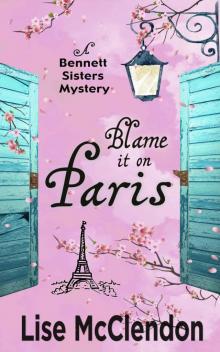 Blame it on Paris (Bennett Sisters Mysteries Book 7)
Blame it on Paris (Bennett Sisters Mysteries Book 7)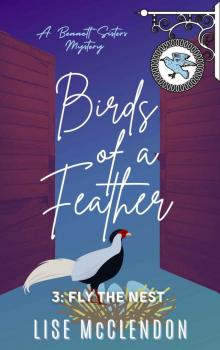 Birds of a Feather: 3: Fly the Nest (Bennett Sisters Mysteries Book 16)
Birds of a Feather: 3: Fly the Nest (Bennett Sisters Mysteries Book 16)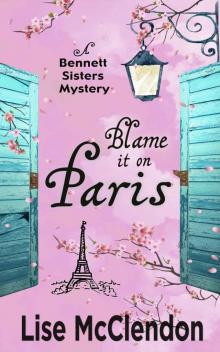 Blame it on Paris
Blame it on Paris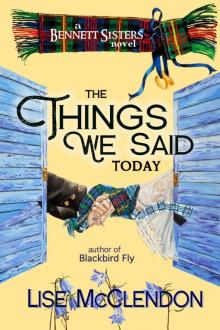 The Things We Said Today
The Things We Said Today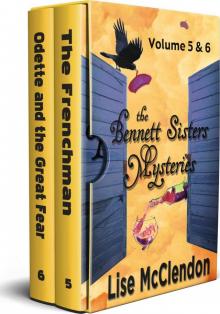 Bennett Sisters Mysteries Volume 5 & 6
Bennett Sisters Mysteries Volume 5 & 6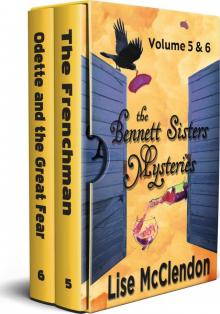 Bennett Sisters Mysteries Box Set 2
Bennett Sisters Mysteries Box Set 2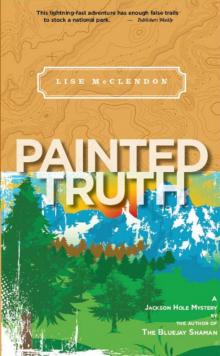 Painted Truth
Painted Truth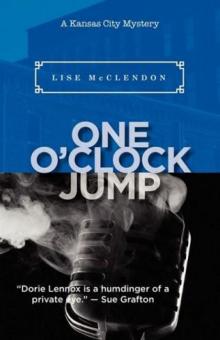 One O'Clock Jump
One O'Clock Jump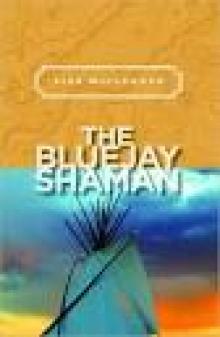 The Bluejay Shaman (Alix Thorssen Mystery Series)
The Bluejay Shaman (Alix Thorssen Mystery Series) Swing Town Mysteries Dorie Lennox Box Set
Swing Town Mysteries Dorie Lennox Box Set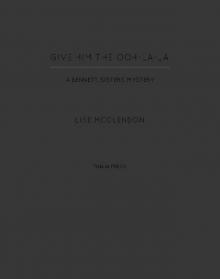 Give Him the Ooh-la-la
Give Him the Ooh-la-la Blackbird Fly
Blackbird Fly All Your Pretty Dreams
All Your Pretty Dreams Nordic Nights (The Alix Thorssen Mysteries)
Nordic Nights (The Alix Thorssen Mysteries)